Because of memory limitations, I’m sending this in two sections.
I’m going to have to send the complete article as a third attachment.
I believe this article shows the completed “Positive Changes That Are Occurring” book coming into form. I like the way the quotes introduction leads the reader through a way of thinking. I also like how it repeats the same points using different authors. Some subset of those reading it are going to be changed by those juxtapositions. They’re going to gain insight that they did not have previously, and that insight will not be lost once it has been gained.
In the book, instead of the year in review, it will simply be the time period covered by the study, with different chapters on different positive changes that are taking place.
Thanks to everyone for being here. How is this not the year we break through?
Jeff Miller, Brooklyn, New York, January 5, 2020
Positive Changes That Are Occurring, 2020 - The Quotes
“For there is but one essential justice which cements society, and one law which establishes this justice. This law is right reason, which is the true rule of all commandments and prohibitions. Whoever neglects this law, whether written or unwritten, is necessarily unjust and wicked.”
― Marcus Tullius Cicero, On the Laws"
“As my sufferings mounted, I soon realized that there were two ways in which I could respond to my situation – either to react with bitterness or seek to transform the suffering into a creative force. I decided to follow the latter course.”
― Martin Luther King Jr.
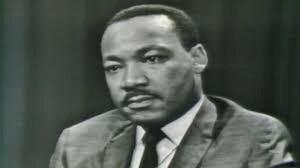
(Martin Luther King, Jr.)
“Honest pioneer work in the field of science has always been, and will continue to be, life’s pilot. On all sides, life is surrounded by hostility. This puts us under an obligation.”
- Wilhelm Reich
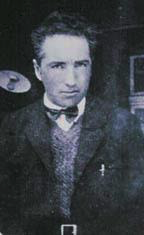
(Wilhelm Reich)
Sprawling on the fringes of the city
In geometric order
An insulated border
In-between the bright lights
And the far, unlit unknown
Growing up, it all seems so one-sided
Opinions all provided
The future pre-decided
Detached and subdivided
In the mass-production zone
Nowhere is the dreamer
Or the misfit so alone
Subdivisions
In the high school halls
In the shopping malls
Conform or be cast out
Subdivisions
In the basement bars
In the backs of cars
Be cool or be cast out
Any escape might help to smooth
The unattractive truth
But the suburbs have no charms to soothe
The restless dreams of youth
From “Subdivisions” by Alex Zivojinovich / Gary Lee Weinrib / Neil Elwood Peart, 1982
“You must live in the present, launch yourself on every wave, find your eternity in each moment. Fools stand on their island of opportunities and look toward another land. There is no other land; there is no other life but this.”
― Henry David Thoreau

(Henry David Thoreau)
“Eddie would go.”
- Mark Foo

(Mark Foo)
“No one surfed like Eddie. He would take off on a huge scary wave, and he’d be sliding down it with the biggest smile you ever saw. The rest of us were nervous. Eddie belonged there; it was his home.”
- Clyde Aikau

(Eddie Aikau, North Shore, Oahu)
The first Quiksilver Eddie Aikau Big Wave Invitational was held in the winter of 1985/1986 at Waimea Bay. The unique contest requirement was that waves had to be 20 feet or bigger. When the waves got huge and the folks in charge were deciding whether to raise the green flag or not, Mark Foo said: “Eddie Would Go.” The expression stuck, and the contest got underway.
It took a while for Martin Potter to openly admit that he fled the North Shore of Oahu in 1981 because he was scared. There was a giant swell forecast to smash the North Shore, and Pottz, who was 16 at the time, wanted none of it. After one of the most auspicious debuts in the history of pro surfing, Martin Potter ran away.
The fear on the North Shore can become overwhelming. One year while hanging with a bunch of QS surfers all crammed into a small unit, I witnessed this kind of paralyzing fear. A massive swell was forecast, and all of the crew were still in the event at Sunset.
When the forecast came through, some were calm, but others were totally rattled. It was going to be a proper 10-foot at Sunset, with bigger sets. One young gentleman declared that he wanted fuck-all to do with it, and would not be paddling out at Sunset. Some were surprised and there was some ragging among the crew, but it was fair enough. He was overwhelmed with anxiety about Sunset at 10-foot because, quite simply, it is terrifying.
(Short story – he didn’t paddle out, he flew home chagrined, and gave up a professional surfing career a little later.)
Pottz was on a plane home before the swell hit in 1981, but he had made his debut with some massive wins that year and had a taste of the heady world of professional surfing. He liked it. He wanted to own it, and he was determined to come back stronger and braver.
The following year was déjà vu for so, many including Pottz. He now wanted to prove himself to the world, and that opportunity came to him in the semi-finals of the 1982 Pipe Masters. Up against Michael Ho, Pottz was confronted by a wave that struck the fear of death in him. It was a huge peak that broke on second reef, and Michael knew that it was the wave that was going to be the heat winner. Ho glanced at Pottz like he wasn’t even there, and that little bit of indifference was the spark that ignited Martin’s desire to charge.
There was a chip shot, but when a massive 12-foot wall of water moves over second reef and sets to implode over the inside reef, chip shots are not game-changers. As a 17-year-old, Pottz was still skinny and kind of small. For him to paddle into that wave was a biblical ask. No one thought he would go, and no one knew at that stage, that he had it in him.
Unbelievably, Pottz went. He made the drop and stood up in a heaving cathedral of a tube. He navigated the barrel, did a half-claim, and attempted a cutback, as the beach erupted. It was a defining moment for our sport and a pivotal moment for Pottz. A single wave slingshot him into another sphere of surfing.
The wave won him the respect of the Hawaiian people, and the rest of the surfers on tour. There were many of his peers who probably wouldn’t have gone on that wave. It was a beast.
In his biopic ‘Strange Desires’, Pottz spells out that moment. “There comes a time in everyone’s life when you’ve got to put all your feelings and emotions aside, and just go, and if you can’t do that, then it’s going to take you a long time to get respect,” he said. “If I had let that wave go, it would have taken me another two or three years to get that level of respect on tour.”
(Martin Potter, Pipe Masters, Ehukai Beach, North Shore, Oahu, 1982)
My shit is real, I had to pioneer in this
Around the way, all the fake niggaz fear this
Paragraphs bust your membrane
On and on I bust through like teflon
Prodigy, from Mobb Deep’s “Me and My Crew”, 1991
Mobb Deep: Albert Johnson, aka “Prodigy” (left), Kejuan Waliek Muchita, aka “Havoc” (right)
“As you are aware, Watson, there is no one who knows the higher criminal world of London so well as I do. For years past I have continually been conscious of some power behind the malefactor, some deep organizing power which forever stands in the way of the law, and throws its shield over the wrong-doer. Again and again in cases of the most varying sorts—forgery cases, robberies, murders—I have felt the presence of this force, and I have deduced its action in many of those undiscovered crimes in which I have not been personally consulted. For years I have endeavored to break through the veil which shrouded it, and at last the time came when I seized my thread and followed it, until it led me, after a thousand cunning windings, to ex-Professor Moriarty of mathematical celebrity.
“He is the Napoleon of crime, Watson. He is the organizer of half that is evil and of nearly all that is undetected in this great city. He is a genius, a philosopher, an abstract thinker. He has a brain of the first order. He sits motionless, like a spider in the center of its web, but that web has a thousand radiations, and he knows well every quiver of each of them. He does little himself. He only plans. But his agents are numerous and splendidly organized. Is there a crime to be done, a paper to be abstracted, we will say, a house to be rifled, a man to be removed—the word is passed to the Professor, the matter is organized and carried out. The agent may be caught. In that case money is found for his bail or his defense. But the central power which uses the agent is never caught—never so much as suspected. This was the organization which I deduced, Watson, and which I devoted my whole energy to exposing and breaking up."
From “The Memoirs of Sherlock Holmes - The Final Problem”, by Sir Arthur Conan Doyle, 1893
"I like the scientific spirit—the holding off, the being sure but not too sure, the willingness to surrender ideas when the evidence is against them: this is ultimately fine—it always keeps the way beyond open—always gives life, thought, affection, the whole man, a chance to try over again after a mistake—after a wrong guess.”
― Walt Whitman, Walt Whitman’s Camden Conversations, 1895

(Walt Whitman)
“I believe in the equality of man; and I believe that religious duties consist in doing justice, loving mercy, and endeavoring to make our fellow-creatures happy.”
Thomas Paine

(Thomas Paine)
“Where justice is denied, where poverty is enforced, where ignorance prevails, and where any one class is made to feel that society is an organized conspiracy to oppress, rob and degrade them, neither persons nor property will be safe.”
― Frederick Douglass
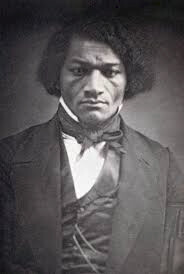
(Frederick Douglass)
“If you tremble with indignation at every injustice then you are a comrade of mine.”
― Ernesto Che Guevara

Ernesto Che Guevara)
“There exists in man a mass of sense lying in a dormant state, and which, unless something excites it to action, will descend with him, in that condition, to the grave.”
― From “The Rights of Man”, by Thomas Paine, 1791
“To be good is noble; but to show others how to be good is nobler, and no trouble.
- Mark Twain
"O for a man who is a man, and, as my neighbor says, has a bone in his back which you cannot pass your hand through!”
From “Civil Disobedience”, by Henry David Thoreau, 1849
“On evil’s cushion poised, His Majesty,
Satan Thrice-Great, lulls our charmed soul, until
He turns to vapor what was once our will:
Rich ore, transmuted by his alchemy.”
― Baudelaire
“Open avowal of dictatorship is much less dangerous than sham democracy. The first one can fight; sham democracy is insidious.”
― From “The Mass Psychology of Fascism”, by Wilhelm Reich, 1933



“Unless a man becomes the enemy of an evil, he will not even become its slave but rather its champion.”
― G.K. Chesterton
“In keeping silent about evil, in burying it so deep within us that no sign of it appears on the surface, we are implanting it, and it will rise up a thousand fold in the future. When we neither punish nor reproach evildoers, we are not simply protecting their trivial old age, we are thereby ripping the foundations of justice from beneath new generations.”
― From “The Gulag Archipeligo”, by Aleksandr I. Solzhenitsyn, 1973
“I became convinced that noncooperation with evil is as much a moral obligation as is cooperation with good.”
― From “The Autobiography of Martin Luther King, Jr.”, by Clayborne Carson, 1998
“The real man smiles in trouble, gathers strength from distress, and grows brave by reflection.”
― Thomas Paine
“It is necessary to the happiness of man that he be mentally faithful to himself. Infidelity does not consist in believing, or in disbelieving, it consists in professing to believe what he does not believe.”
From “The Age of Reason”, by Thomas Paine, 1794
“It is error only, and not truth, that shrinks from inquiry.”
― Thomas Paine
“The truth must be quite plain, if one could just clear away the litter.”
From “A Caribbean Mystery”, by Agatha Christie, 1964
“And the truth must finally lie in that which every oppressed individual feels within himself but hasn’t the courage to express.”
From “Beyond Psychology: Letters and Journals”, by Wilhelm Reich, 1934-1939
“But such is the irresistible nature of truth, that all it asks, and all it wants, is the liberty of appearing.”
From “The Rights of Man”, by Thomas Paine, 1791
“Thirst was made for water; inquiry for truth.”
From “The Great Divorce”, by C.S. Lewis, 1945
“How often have I said to you that when you have eliminated the impossible, whatever remains, however improbable, must be the truth?”
Sherlock Holmes, from “The Sign of the Four”, by Sir Arthur Conan Doyle, 1890
“When men yield up the privilege of thinking, the last shadow of liberty quits the horizon.”
― Thomas Paine
“When the mob and the press and the whole world tell you to move. Your job is to plant yourself like a tree beside the river of truth and tell the whole world: “No, you move.”
― Mark Twain
“It takes two to speak the truth - one to speak and another to hear.”
― Henry David Thoreau
“Power, no matter what kind of power it is, without a foundation in truth, is a dictatorship, more or less and in one way or another, for it is always based on man’s fear of the social responsibility and personal burden that “freedom” entails.”
From “The Mass Psychology of Fascism”, by Wilhelm Reich, 1933
“Orthodoxy means not thinking–not needing to think. Orthodoxy is unconsciousness.”
― From “1984”, by George Orwell, 1949
“Thinking is man’s only basic virtue, from which all the others proceed. And his basic vice, the source of all his evils, is that nameless act which all of you practice, but struggle never to admit: the act of blanking out, the willful suspension of one’s consciousness, the refusal to think - not blindness, but the refusal to see; not ignorance, but the refusal to know. It is the act of unfocusing your mind and inducing an inner fog to escape the responsibility of judgment - on the unstated premise that a thing will not exist if only you refuse to identify it, that A will not be A so long as you do not pronounce the verdict ‘It is.”
― From “Atlas Shrugged”, by Ayn Rand, 1957
“Reason obeys itself; and ignorance submits to whatever is dictated to it.”
― Thomas Paine
"It is in refusing to recognize that we worship something that we move from the worship ‘of’ that thing to slavery ‘to’ that thing.”
― Craig D. Lounsbrough
“In the period of 2010-2014, twelve new fish species have been recorded in the Adriatic Sea. Certain fish species were probably related to recent processes in the Adriatic Sea, such as bioinvasion and tropicalisation.”
- Frontiers in Marine Science, 2015
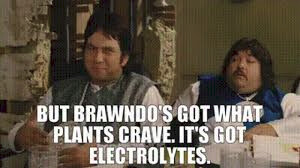
(From “Idiocracy”, by Mike Judge, 2006)
“I suppose there are two views about everything.”
“Eh? Two views? There are a dozen views about everything until you know the answer. Then there’s never more than one.”
From “That Hideous Strength”, by C.S. Lewis, 1945
“One may outwit another, but not all the others.”
― François de La Rochefoucauld
“My hate is general, I detest all men;
Some because they are wicked and do evil,
Others because they tolerate the wicked,
Refusing them the active vigorous scorn
Which vice should stimulate in virtuous minds.”
― Moliere, The Misanthrope

(Coincidence theorists refuse to believe that Donald Trump and Hillary Clinton both read teleprompters, and that their facial expressions are not accidental. You need to understand Kabuki theater:

(Japanese Kabuki Theater “Demon” mask)
“Almost all people are hypnotics. The proper authority saw to it that the proper belief should be induced, and the people believed properly.”
― Charles Fort
“Madness is something rare in individuals — but in groups, parties, peoples, and ages, it is the rule.”
― From “Beyond Good and Evil”, by Friedrich Nietzsche, 1886
"I know your race. It is made up of sheep. It is governed by minorities. Seldom or never by majorities. It suppresses its feelings and beliefs and follows the handful that makes the most noise. Sometimes the noisy handful is right. Sometimes wrong. But no matter, the crowd follows it. The vast majority of the race, whether savage or civilized are secretly kindhearted, and shrink from inflicting pain. But in the presence of the aggressive and pitiless minority they don’t dare to assert themselves.”
From “The Mysterious Stranger”, by Mark Twain, 1916
“Society can and does execute its own mandates: and if it issues wrong mandates instead of right, or any mandates at all in things with it ought not to meddle, it practices a social tyranny more formidable than many kinds of political oppression, since, though not usually upheld by such extreme penalties, it leaves fewer means of escape, penetrating much more deeply into the details of life, and enslaving the soul itself.”
― From “On Liberty”, by John Stuart Mill, 1859


“To argue with a man who has renounced the use and authority of reason, and whose philosophy consists in holding humanity in contempt, is like administering medicine to the dead, or endeavoring to convert an atheist by scripture.”
― From “The American Crisis”, by Thomas Paine, 1777
“It was one of the greatest errors in evaluating dictatorship to say that the dictator forces himself on society against its own will. In reality, every dictator in history was nothing but the accentuation of already existing state ideas which he had only to exaggerate in order to gain power.”
From “The Mass Psychology of Fascism”, by Wilhelm Reich, 1933
"Common sense will tell us, that the power which hath endeavoured to subdue us, is of all others, the most improper to defend us.”
― From “Common Sense”, by Thomas Paine, 1776
“A body of men holding themselves accountable to nobody ought not to be trusted by anybody.”
― Thomas Paine
“If everyone fought for their own convictions there would be no war.”
― From “War and Peace”, by Leo Tolstoy, 1865
“The masses never revolt of their own accord, and they never revolt merely because they are oppressed. Indeed, so long as they are not permitted to have standards of comparison, they never even become aware that they are oppressed.”
― From “1984”, by George Orwell, 1949
“The hardest thing to explain is the glaringly evident which everybody has decided not to see.”
From “The Fountainhead”, by Ayn Rand, 1943
“The world is full of obvious things which nobody by any chance ever observes.”
― From “The Hound of the Baskervilles”, by Sir Arthur Conan Doyle, 1902
"In a way, the world−view of the Party imposed itself most successfully on people incapable of understanding it. They could be made to accept the most flagrant violations of reality, because they never fully grasped the enormity of what was demanded of them, and were not sufficiently interested in public events to notice what was happening. By lack of understanding they remained sane. They simply swallowed everything, and what they swallowed did them no harm, because it left no residue behind, just as a grain of corn will pass undigested through the body of a bird.”
― From “1984”, by George Orwell, 1949
“He was a fattish but active man of paralyzing stupidity, a mass of imbecile enthusiasm—one of those completely unquestioning, devoted drudges on whom, more even than on the Thought Police, the stability of the Party depended.”
From “1984”, by George Orwell, 1949
“Mundus vult decipi’—the world wants to be deceived. To live without deception presupposes standards beyond the reach of most people whose existence is largely shaped by compromise, evasion and mutual accommodation. Could they face their weakness, their vanity and selfishness, without a mask?”
― Abraham Joshua Heschel
“The duplicity of others must always be shocking when one is unconscious of one’s own.”
― From “The Mask of Dimitrios”, by Eric Ambler, 1944
“When a person cannot deceive himself the chances are against his being able to deceive other people.”
- Mark Twain
“No evil dooms us hopelessly except the evil we love, and desire to continue in, and make no effort to escape from. ”
― From “Daniel Deronda”, by George Eliot, 1876
“There will be, in the next generation or so, a pharmacological method of making people love their servitude, and producing dictatorship without tears, so to speak, producing a kind of painless concentration camp for entire societies, so that people will in fact have their liberties taken away from them, but will rather enjoy it, because they will be distracted from any desire to rebel by propaganda or brainwashing, or brainwashing enhanced by pharmacological methods. And this seems to be the final revolution.”
― Aldous Huxley
“They are pleased to deceive themselves, as if they deceived Fate at the same time.”
― Seneca, On the Shortness of Life
“Demons are like obedient dogs; they come when they are called.”
Remy de Gourmont
“Now the Elves made many rings; but secretly Sauron made One Ring to rule all the others, and their power was bound up with it, to be subject wholly to it and to last only so long as it too should last. And much of the strength and will of Sauron passed into that One Ring; for the power of the Elven-rings was very great, and that which should govern them must be a thing of surpassing potency; and Sauron forged it in the Mountain of Fire in the Land of Shadow. And while he wore the One Ring he could perceive all the things that were done by means of the lesser rings, and he could see and govern the very thoughts of those that wore them.”
From “The Silmarillion”, by J.R.R. Tolkien, published posthumously in 1977

(Jim Carrey as the Riddler in “Batman Forever”, 1995 - he’s taking in the brain waves his purpose-built set-top box has stolen from unwitting television viewers. They’re kidding, kidding!)

(The Internet in 1995)
Roughly one in five smart phone users will become addicted and have serious behavioral problems.
The suicide rate in the ten highest smart phone penetration nations is 50% higher than that in ten lowest smart phone penetration nations.
From 1999 to 2018, the increase in suicide has been twice as large among women as it has been among men.
The number of women who use their phones more than 6 hours a day is twice that of men who did the same.
“The more data you compile the clearer this will become and I think it’s worth pursuing but just broaching the subject is a pioneering effort.”
Don Croft to Jeff Miller, on technology driven suicide, 2017


“Sauron was become now a sorcerer of dreadful power, master of shadows and of phantoms, foul in wisdom, cruel in strength, misshaping what he touched, twisting what he ruled, lord of werewolves; his dominion was torment.”
From “The Silmarillion”, by J.R.R. Tolkien, edited by Christopher Tolkien, 1977
“The shadow of that hyddeous strength, sax myle and more it is of length”
From “A****ne Dialog”, by Sir David Lyndsay, describing the Tower of Babel, 1555 (The quote introduces C.S. Lewis’ “That Hideous Strength”, from 1945)
But suddenly the mirror went altogether dark, as dark as if a hole had opened in the world of sight, and Frodo looked into emptiness. In the black abyss there appeared a single Eye that slowly grew, until it filled nearly all the Mirror. So terrible was it that Frodo stood rooted, unable to cry out or to withdraw his gaze. The Eye was rimmed with fire, but was itself glazed, yellow as a cat’s, watchful and intent, and the black slit of its pupil opened on a pit, a window into nothing.
Then the Eye began to rove, searching this way and that; and Frodo knew with certainty and horror that among the many things that it sought he himself was one. But he also knew that it could not see him - not yet, not unless he willed it. The Ring that hung upon its chain about his neck grew heavy, heavier than a great stone, and his head was dragged downwards. The Mirror seemed to be growing hot and curls of steam were rising from the water. He was slipping forward…
‘I know what it is you last saw,’ she said; ‘for that is also in my mind. do not be afraid! But do not think that only by singing amid the trees, nor even by the slender arrows of elvenbows, is this land of Lothlórien maintained and defended against the Enemy. I say to you, Frodo, that even as I speak to you, I perceive the Dark Lord and know his mind, or all his mind that concerns the Elves. And he gropes ever to see me and my thought. But still the door is closed!’
From “The Fellowship of the Ring”, by J.R.R. Tolkien, 1954
He rose deliberately from his chair and came towards them across the soundless carpet. A little of the official atmosphere seemed to have fallen away from him with the Newspeak words, but his expression was grimmer than usual, as though he were not pleased at being disturbed. The terror that Winston already felt was suddenly shot through by a streak of ordinary embarrassment. It seemed to him quite possible that he had simply made a stupid mistake. For what evidence had he in reality that O’Brien was any kind of political conspirator? Nothing but a flash of the eyes and a single equivocal remark: beyond that, only his own secret imaginings, founded on a dream. He could not even fall back on the pretence that he had come to borrow the dictionary, because in that case Julia’s presence was impossible to explain. As O’Brien passed the telescreen a thought seemed to strike him. He stopped, turned aside and pressed a switch on the wall. There was a sharp snap. The voice had stopped.
Julia uttered a tiny sound, a sort of squeak of surprise. Even in the midst of his panic, Winston was too much taken aback to be able to hold his tongue.
‘You can turn it off!’ he said.
‘Yes,’ said O’Brien, ‘we can turn it off. We have that privilege.’
From “1984”, by George Orwell, 1949
A study in 2020 showed that living in cities is associated with an almost 40% higher risk of depression, over 20% more anxiety, and double the risk of schizophrenia. That same month, a study of Chinese adults ages 65 and older showed that living in urban areas later in life is associated with better initial cognitive status but a faster rate of cognitive decline.
It’s the higher level of Death energy in the ether in urban areas that drives those numbers. That’s because moral and mental health vary directly with that of the subject’s etheric environment.
A Canadian Medical Association study from February 2020 found that excess smartphone and social media use were linked to mental distress and suicide risk. That’s because moral and mental health vary directly with that of the subject’s etheric environment.
“The world is full of magic things, patiently waiting for our senses to grow sharper.”
― W.B. Yeats
“Materialism can no longer claim to be a scientific philosophy.”
From “Janus: A Summing Up”, by Arthur Koestler, 1978
“The day science begins to study non-physical phenomena, it will make more progress in one decade than in all the previous centuries of its existence.”
― Nikola Tesla
“Materialism’s first deadly legacy is the rejection of reason and objective truth. Nineteenth-century materialists depicted our thoughts as the irrational products of environment or heredity or brain chemistry. As a consequence, the intellectual classes became convinced that only the reality was material, and thus the only true explanations were reductive. If you wanted to explain a flower, you described its cell structure, not its beauty. If you wanted to explain human beings, you looked not to their greatest achievements, but to the raw materials that made them up. This sort of reductionism permeates contemporary society, from politics and the social sciences to literature and the performing arts.”
From “C.S. Lewis and Materialism”, by John G. West, August 2, 2012
“I believe that mycelium is the neurological network of nature. Interlacing mosaics of mycelium infuse habitats with information-sharing membranes. These membranes are aware, react to change, and collectively have the long-term health of the host environment in mind. The mycelium stays in constant molecular communication with its environment, devising diverse enzymatic and chemical responses to complex challenges.”
― From “Mycelium Running: How Mushrooms Can Help Save the World”, by Paul Stamets, 2005
RAY: Mr. Mayor, we are here tonight because a psychomagnotheric slime flow of immense proportions is building beneath the city.
EGON: Negative human emotions are materializing in the form of a viscous, psychoreactive plasm with explosive supernormal potential.
From “Ghostbusters II”, written by Dan Ackroyd and Harold Ramis, 1989
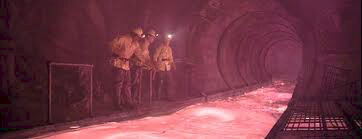
The Ghostbusters examine the psychomanotheric slime flow beneath New York)
The incidence of schizophrenia is 100% higher in cities than it is in rural areas.
The incidence of mental disorder or insanity is 82% higher in areas near the center of the city, vs. the residential sections near the outskirts.
The incidence of psychosis is 77% higher in urban areas than in rural areas.
The depression rate is 40% higher in cities than it is in rural areas.
The rate of cognitive decline is 32% faster in cities than in rural areas.
The incidence of Alzheimer’s disease is 6-19% higher in cities than it is in rural areas.
That’s because moral and mental health vary directly with that of the subject’s etheric environment.
"Yet mad I am not…and very surely do I not dream.”
― From “The Black Cat”, by Edgar Allan Poe, 1843
“There is something which unites magic and applied science while separating both from the “wisdom” of earlier ages. For the wise men of old the cardinal problem had been how to conform the soul to reality, and the solution had been knowledge, self-discipline, and virtue. For magic and applied science alike the problem is how to subdue reality to the wishes of men: the solution is a technique; and both, in the practice of this technique, are ready to do things hitherto regarded as disgusting and impious.”
—From “The Abolition of Man”, by C.S. Lewis, 1943
“"There is something fascinating about science. One gets such wholesale returns of conjecture out of such a trifling investment of fact.”
― From “Life on the Mississippi”, by Mark Twain, 1883
“The first principle of value that we need to rediscover is this: that all reality hinges on moral foundations. In other words, that this is a moral universe, and that there are moral laws of the universe just as abiding as the physical laws.
― From “Rediscovering Lost Values”, by Martin Luther King Jr., 1954
“Let them call me rebel and welcome, I feel no concern from it; but I should suffer the misery of devils, were I to make a whore of my soul by swearing allegiance to one whose character is that of a sottish, stupid, stubborn, worthless, brutish man.”
― From “The Crisis”, by Thomas Paine, 1775
“My name is Sherlock Holmes,” said my companion. “Possibly it is familiar to you. In any case, my business is that of every other good citizen – to uphold the law. It seems to me that you have much to answer for.”
From “The Casebook of Sherlock Holmes”, by Sir Arthur Conan Doyle, 1927
“Bond looked at the beautiful day and smiled. And no man, not even Mr. Big, would have liked the expression on his face.”
― From “Live and Let Die”, by Ian Fleming, 1954
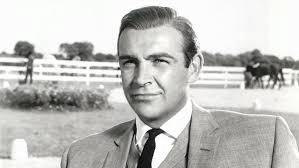
(Sean Connery, as James Bond in “Goldfinger”, 1965)
“Mr Bond, they have a saying in Chicago: ‘Once is happenstance. Twice is coincidence. The third time it’s enemy action’.”
From “Goldfinger”, by Ian Fleming, 1959
From Dr. Watson’s summary list of Sherlock Holmes’s strengths and weaknesses:
-
Knowledge of Anatomy: Accurate but unsystematic.
-
Knowledge of Sensational Literature: Immense. He appears to know every detail of every horror perpetrated in the century.
-
Plays the violin well.
-
Is an expert singlestick player, boxer, and swordsman.
-
Has a good practical knowledge of British law.
From “A Study in Scarlet”, by Sir Arthur Conan Doyle, 1887
"I like a good detective story myself. Lots of nonsense written, though. Criminal discovered in last Chapter. Everyone dumbfounded. Real crime - you’d know at once.”
― Miss Howard, from “The Mysterious Affair at Styles”, by Agatha Christie, 1920
“The criminal is the creative artist; the detective only the critic.”
― From “The Blue Cross: A Father Brown Mystery”, by G.K. Chesterton, The Blue Cross: A Father Brown Mystery, 1910
“I love the man that can smile in trouble, that can gather strength from distress, and grow brave by reflection. 'Tis the business of little minds to shrink; but he whose heart is firm, and whose conscience approves his conduct, will pursue his principles unto death.”
― Thomas Paine
Courage is resistance to fear, mastery of fear, not the absence of fear.
- Mark Twain
John McClane: You know what you get for being a hero? Nothin’. You get shot at. You get a little pat on the back, blah, blah, blah, attaboy. You get divorced. Your wife can’t remember your last name. Your kids don’t want to talk to you. You get to eat a lot of meals by yourself. Trust me, kid, nobody wants to be that guy.
Matt Farrell: Then why are you doing this?
John McClane: Because there’s nobody else to do it right now, that’s why. Believe me, if there were somebody else to do it, I’d let them do it, but there’s not. So, we’re doing it.
Matt Farrell: Ah. That’s what makes you that guy.
From the film “Live Free or Die Hard”, written by Mark Bomback, 2007
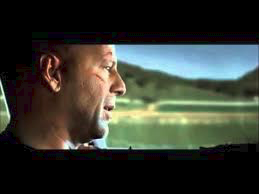
(Bruce Willis, as John McClane, in “Live Free or Die Hard”, 19870
“Are you a communist?"
“No I am an anti-fascist”
“For a long time?”
"Since I have understood fascism.”
From “For Whom the Bell Tolls”, by Ernest Hemingway, 1940

(Woody Gurthrie)
fascism noun, often capitalized
fas· cism | \ ˈfa-ˌshi-zəm \
Kids Definition of fascism
: a political system headed by a dictator in which the government controls business and labor and opposition is not permitted
“La plus belle des ruses du diable est de vous persuader qu’il n’existe pas."
(“The devil’s finest trick is to persuade you that he does not exist.”)”
From "Le Spleen de Paris", by Charles Baudelaire, 1869
“The devil’s agents may be of flesh and blood, may they not?”
Sherlock Holmes, from “The Hound of the Baskervilles”, by Sir Arthur Conan Doyle, 1902
“That there are men in all countries who get their living by war, and by keeping up the quarrels of Nations is as shocking as it is true…”
― Thomas Paine
“There are thousands who are in opinion opposed to slavery and to the war, who yet in effect do nothing to put an end to them; who, esteeming themselves children of Washington and Franklin, sit down with their hands in their pockets, and say that they know not what to do, and do nothing…”
― From “Civil Disobedience and Other Essays”, by Henry David Thoreau, 1849
“Put Neidermeyer on it. He’s a sneaky little shit just like you.”
Dean Vernon Wormer, from “Animal House”, by Harold Ramis, Douglas Kenney and Chris Miller, 1978

(Mark Metcalf as Doug Niedermeyer, Animal House, 1978)
“Tricks and treachery are the practice of fools, that don’t have brains enough to be honest.”
- Benjamin Franklin
“Crime causes so much horror, even to them [criminals], that they would like, in order to escape from the necessity they feel to be bad, to be believed and always to be depicted as virtuous.”
― From “Justines, or The Misfortunes of Virtue”, by the Marquis Donatien Alphonse François de Sade, 1791
"Do not have the Fairy for your enemy. For the rest — you laugh at them.”
“The Fairy?”
“Yes. Her they call the Fairy. Oh my God, a terrible Inglesaccia! She is the head of our police, the Institutional Police. Ecco, she come. I will present you. Miss Hardcastle, permit that I present to you Mr. Studdock.”
Mark found himself writhing from the stoker’s or carter’s hand-grip of a big woman in a black, short-skirted uniform. Despite a bust that would have done credit to a Victorian barmaid, she was rather thickly built than fat and her iron-grey hair was cropped short. Her face was square, stern, and pale, and her voice deep.A smudge of lip- stick laid on with violent inattention to the real shape of her mouth was her only concession to fashion and she rolled or chewed a long black cheroot, unlit, between her teeth. As she talked she had a habit of removing this, staring intently at the mixture of lipstick and saliva on its mangled end, and then replacing it more firmly than before. She sat down immediately in a chair close to where Mark was standing, flung her right leg over one of the arms, and fixed him with a gaze of cold intimacy."
From “That Hideous Strength”, by C.S. Lewis, 1945
“Most Gen Z’ers are more likely to turn down or temporarily pause some social media sites rather than abandoning them completely, so there’s no need to panic.”
Lesley Bielby, chief strategy officer at Hill Holliday

(Lesley Bielby, Chief Strategy Officer at Hill Holiday)
“Plenty of people in our age do entertain the monstrous dreams of power that Mr. Lewis attributes to his characters, and we are within sight of the time when such dreams will be realizable.”
Review of “That Hideous Strength”, by C.S. Lewis, 1945 by George Orwell, Manchester Evening News, 16 August 1945
“…the lion cannot defend himself against snares and the fox cannot defend himself against wolves. Therefore, it is necessary to be a fox to discover the snares and a lion to terrify the wolves. Those who rely simply on the lion do not understand what they are about. Therefore a wise lord cannot, nor ought he to, keep faith when such observance may be turned against him, and when the reasons that caused him to pledge it exist no longer. If men were entirely good this precept would not hold, but because they are bad, and will not keep faith with you, you too are not bound to observe it with them. Nor will there ever be wanting to a prince legitimate reasons to excuse this nonobservance. Of this endless modern examples could be given, showing how many treaties and engagements have been made void and of no effect through the faithlessness of princes; and he who has known best how to employ the fox has succeeded best.
But it is necessary to know well how to disguise this characteristic, and to be a great pretender and dissembler; and men are so simple, and so subject to present necessities, that he who seeks to deceive will always find someone who will allow himself to be deceived. One recent example I cannot pass over in silence. Alexander VI did nothing else but deceive men, nor ever thought of doing otherwise, and he always found victims; for there never was a man who had greater power in asserting, or who with greater oaths would affirm a thing, yet would observe it less; nevertheless his deceits always succeeded according to his wishes, because he well understood this side of mankind."
From “The Prince”, by Niccolò Machiavelli, 1532
“One who never anticipates deceit or expects duplicity, and yet is the first to recognize such things – is that not a sage indeed?”
― From “The Analects”, by Confucius, 1533
The linguistic root of “Covid” is from the old English “Covin”:
legal-dictionary.thefreedictionary.com › covin
COVIN, fraud. A secret contrivance between two or more persons to defraud and prejudice another of his rights. Co. Litt 357, b; Com. Dig. Covin, A; 1 Vin.
"Although generally regarded as the man who first swept to power (in 1922) as the savior of his country from communism, this book shows that, on the contrary, while communism was almost no threat at this time, by 1945, as a direct result of Mussolini’s reign, communism was set to spread rapidly in Europe, because he deliberately chose to turn Italy into a ‘social minefield’ primed to explode after his death, should he be defeated.
It is (next to the history of the Third Reich) the most extraordinary case-study of a man whose skill was in building myths about himself and his movement that convinced not just a whole country but the international governments of his day. He had a brilliant and monumental talent for deceit, which he exercised so effectively that he eventually fell victim to it himself, fooled by his own propaganda into entering a war his country could only lose, in a terrible way."
From “Mussolini”, by Denis Mack Smith, 1982
“They have an engine called the Press whereby the people are deceived.”
From “That Hideous Strength”, by C.S. Lewis, 1945
“The press is a gang of cruel faggots. Journalism is not a profession or a trade. It is a cheap catch-all for fuckoffs and misfits—a false doorway to the backside of life, a filthy piss-ridden little hole nailed off by the building inspector, but just deep enough for a wino to curl up from the sidewalk and masturbate like a chimp in a zoo-cage.”
― From “Fear and Loathing in Las Vegas”, by Hunter S. Thompson, 1971
“If you tell a lie big enough and keep repeating it, people will eventually come to believe it. The lie can be maintained only for such time as the State can shield the people from the political, economic and/or military consequences of the lie. It thus becomes vitally important for the State to use all of its powers to repress dissent, for the truth is the mortal enemy of the lie, and thus by extension, the truth is the greatest enemy of the State.”
- Joseph Goebbels
Don’t wanna be an American idiot
One nation controlled by the media
Information Age of hysteria
It’s calling out to idiot America
Welcome to a new kind of tension
All across the alien nation
Where everything isn’t meant to be okay
From “American Idiot”, by Green Day’s Billie Joe Armstrong, 2004
Narrator: The number one movie was called: Ass. And that’s all it was for 90 minutes. It won eight Oscars that year including best screenplay.
From “Idiocracy”, by Mike Judge, 2006
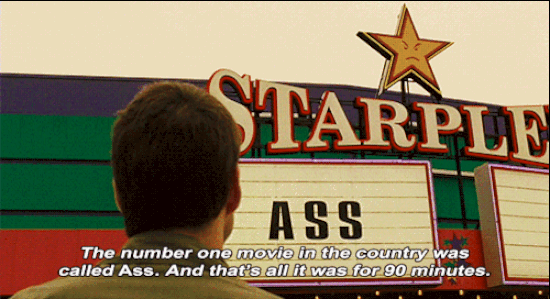
“Let me control the media and I will turn any nation into a herd of pigs.”
- Joseph Goebbels
“If people cannot write well, they cannot think well, and if they cannot think well, others will do their thinking for them.”
― George Orwell
“The great enemy of clear language is insincerity. When there is a gap between one’s real and one’s declared aims, one turns, as it were, instinctively to long words and exhausted idioms, like a cuttlefish squirting out ink.”
From “Politics and the English Language”, by George Orwell, 1946
“They muddy the water, to make it seem deep.”
- Friedrich Nietzsche
“For who makes the fairest show makes most deceit”
- Pericles
“The cheaper the crook, the gaudier the patter.”
― From “The Maltese Falcon”, by Dashiell Hammett, 1929
“It is only prudent never to place complete confidence in that by which we have even once been deceived.”
― René Descartes, Meditations on First Philosophy
“All warfare is based on deception. Hence, when we are able to attack, we must seem unable; when using our forces, we must appear inactive; when we are near, we must make the enemy believe we are far away; when far away, we must make him believe we are near.”
― From “The Art of War”, by Sun Tzu, 5th Century B.C.
"Guard yourself from lying; there is he who deceives and there is he who is deceived.”
― Sextus
“How easy it is to judge rightly after one sees what evil comes from judging wrongly.”
― From “Wives and Daughters”, by Elizabeth Gaskell, 1864
“Everything the State says is a lie, and everything it has it has stolen.”
― Friedrich Nietzsche
“I’m telling you a lie in a vicious effort that you will repeat my lie over and over until it becomes true”
― Lady Gaga
“I related it more to my upbringing, I grew up in a very Christian environment — a very healthy environment and a loving a family — but there were parameters that I didn’t understand, that I questioned it, and it took me until my adult years until I could really try new things… That was satanism, it works really well, I made a pact and the movie came out, so… No, you’re really dealing with certain things as you grow up and you’ve got to try things on for yourself and really figure out what works for you and what doesn’t. I just relate to that time, it’s a very personal time, it’s a comfort system and you cut the tether and find yourself very on your own with nothing to hold on to.”
- Brad Pitt

(Self-described Satanist Brad Pitt)
“The first rule of Fight Club is you don’t talk about Fight Club. The second rule of Fight Club is you don’t talk about Fight Club.”
From “Fight Club”, written by Chuck Palahniuk, 1996
“Society wants to believe it can identify evil people, or bad or harmful people, but it’s not practical. There are no stereotypes.”
― Ted Bundy

(Ted Bundy, who was a politician, serial rapist and serial killer)
Ted Bundy served on the Nelson Rockefeller (1908–1979) presidential campaign in 1968 and the successful reelection campaign of Washington governor Dan Evans. Bundy was appointed to the Seattle Crime Prevention Advisory Committee, and later became an assistant to Ross Davis, the chairman of the Washington State Republican Party.
The University of Oxford’s psychologist Kevin Dutton found ten professions with an unusually high proportion of psychopaths: chief executive officers, lawyers, television and radio news anchors and analysts, salespersons, surgeons journalists, police officers, clergy, chiefs and civil servants.
“The 16 characteristics of psychopaths:
-
Intelligent
-
Rational
-
Calm
-
Unreliable
-
Insincere
-
Without shame or remorse
-
Having poor judgment
-
Without capacity for love
-
Unemotional
-
Poor insight
-
Indifferent to the trust or kindness of others
-
Overreactive to alcohol
-
Suicidal
-
Impersonal sex life
-
Lacking long-term goals
-
Inadequately motivated antisocial behavior
― From “The Mask of Sanity”, by Hervey M. Cleckley, 1941


"We do not have to be mental health professionals to identify the traits of the possible sociopaths among us.”
― From “Type 1 Sociopath - When Difficult People Are More Than Difficult People”, by P.A. Speers, 2014


“I regularly comment on my desire to exploit my admirers or to kill babies and cute animals, and I don’t even need to laugh or smile for people to think I am joking.”
― From "Confessions of a Sociopath: A Life Spent Hiding in Plain Sight", by M. E. Thomas, 2013
"I made several attempts to make myself clear: Just a neighbor come to call and ask the doctor’s advice about gobbling some LSD in the shack just down the hill from his house. I did, after all, have weapons. And I liked to shoot them - especially at night, when the great blue flame would leap out, along with all that noise…and, yes, the bullets, too. WE couldn’t ignore that. Big balls of lead/alloy flaying around the valley at speeds up to 3700 feet per second…
But I always fired into the nearest hill, or, failing that, into blackness. I meant no harm; I just liked the explosions. And I was careful never to kill more than I could eat."
- From “The Great Shark Hunt”, by Hunter S. Thompson, 1979
“We are oft to blame in this, -
'tis too much proved, - that with devotion’s visage,
and pious action we do sugar o’er
the devil himself.”
― From “Hamlet”, by William Shakespeare, 1603
“All I cared about then was catching a glimpse of Chairman Mao. I turned my eyes quickly away from Liu to the front of the motorcade. I spotted Mao’s stalwart back, his right arm steadily waving. In an instant, he had disappeared. My heart sank. Was that all I would see of Chairman Mao? Only a fleeting glimpse of his back? The sun seemed suddenly to have turned gray. All around me the Red Guards were making a huge din. The girl standing next to me had just pierced the index finger of her right hand and was squeezing blood out of it to write something on a neatly folded handkerchief. I knew exactly the words she was going to use. It had been done many times by other Red Guards and had been publicized ad nauseam: “I am the happiest person in the world today. I have seen our Great Leader Chairman Mao!” Watching her, my despair grew. Life seemed pointless. A thought flickered into my mind: perhaps I should commit suicide?”
― From “Wild Swans: Three Daughters of China”, by Jung Chang, 1991
“To live is - to war with trolls
In the holds of the heart and mind”
― Henrik Ibsen
“Wormtongue?” said Gandalf, looking sharply at the guard. “Say no more! My errand is not to Wormtongue, but to the Lord of the Mark himself. I am in haste. Will you not go or send to say that we are come?” His eyes glinted under his deep brows as he bent his gaze upon the man.
“Yes I will go,” he answered slowly. But what names shall I report? And what shall I say of you? Old and weary you seem now, but fell and grim you are beneath, I deem."
“Well do you see and speak,” said the Wizard. For I am Gandalf. I have returned."
From “The Two Towers”, by J.R.R. Tolkien, 1954
“France will rise again. You shall see.”
“Rise?—with this burden of English armies on her back!”
“She will cast it off; she will trample it under foot!” This with spirit.
“Without soldiers to fight with?”
“The drums will summon them. They will answer, and they will march.”
“March to the rear, as usual?”
“No; to the front—ever to the front—always to the front! You shall see.”
“And the pauper King?”
“He will mount his throne—he will wear his crown.”
“Well, of a truth this makes one’s head dizzy. Why, if I could believe that in thirty years from now the English domination would be broken and the French monarch’s head find itself hooped with a real crown of sovereignty—”
“Both will have happened before two years are sped.”
“Indeed? and who is going to perform all these sublime impossibilities?”
“God.”
It was a reverent low note, but it rang clear.
What could have put those strange ideas in her head? This question kept running in my mind during two or three days. It was inevitable that I should think of madness. What other way was there to account for such things? Grieving and brooding over the woes of France had weakened that strong mind, and filled it with fantastic phantoms—yes, that must be it.
But I watched her, and tested her, and it was not so. Her eye was clear and sane, her ways were natural, her speech direct and to the point. No, there was nothing the matter with her mind; it was still the soundest in the village and the best. She went on thinking for others, planning for others, sacrificing herself for others, just as always before. She went on ministering to her sick and to her poor, and still stood ready to give the wayfarer her bed and content herself with the floor. There was a secret somewhere, but madness was not the key to it. This was plain."
From “Personal Recollections of Joan of Arc”, by Mark Twain, 1896
“Water shapes its course according to the nature of the ground over which it flows; the soldier works out his victory in relation to the foe whom he is facing.”
― From “The Art of War”, by Sun Tzu, 5th Century B.C.
“There is no avoiding war, it can only be postponed to the advantage of your enemy.”
From “The Prince”, by Niccolò Machiavelli, 1532
“Move not unless you see an advantage; use not your troops unless there is something to be gained; fight not unless the position is critical.”
― From “The Art of War”, by Sun Tzu, 5th Century B.C.
Joan lay on the grass, weak and suffering, hour after hour, but still insisting that the fight go on. Which it did, but not to much purpose, for it was only under her eye that men were heroes and not afraid. They were like the Paladin; I think he was afraid of his shadow—I mean in the afternoon, when it was very big and long; but when he was under Joan’s eye and the inspiration of her great spirit, what was he afraid of? Nothing in this world—and that is just the truth.
Toward night Dunois gave it up. Joan heard the bugles. “What!” she cried. “Sounding the retreat!”
Her wound was forgotten in a moment. She countermanded the order, and sent another, to the officer in command of a battery, to stand ready to fire five shots in quick succession. This was a signal to the force on the Orleans side of the river under La Hire, who was not, as some of the histories say, with us. It was to be given whenever Joan should feel sure the boulevard was about to fall into her hands—then that force must make a counter-attack on the Tourelles by way of the bridge.
Joan mounted her horse now, with her staff about her, and when our people saw us coming they raised a great shout, and were at once eager for another assault on the boulevard. Joan rode straight to the fosse where she had received her wound, and standing there in the rain of bolts and arrows, she ordered the Paladin to let her long standard blow free, and to note when its fringes should touch the fortress. Presently he said: “It touches.”
“Now, then,” said Joan to the waiting battalions, “the place is yours—enter in! Bugles, sound the assault! Now, then—all together—go!”
And go it was. You never saw anything like it. We swarmed up the ladders and over the battlements like a wave—and the place was our property. Why, one might live a thousand years and never see so gorgeous a thing as that again.
There, hand to hand, we fought like wild beasts, for there was no give-up to those English—there was no way to convince one of those people but to kill him, and even then he doubted. At least so it was thought, in those days, and maintained by many.
From "Personal Recollections of Joan of Arc", by Mark Twain, 1896
Joan of Arc (C1412-1431), French National Heroine, Oil on canvas, by Jules Bastien-Lepage, 1879)
[Missouri guerillas come upon Josey sitting by his family’s graves]
“Bloody Bill” Anderson: Name’s Anderson. Bloody Bill’s what they call me. [Looks around] Red Legs? You’ll find them up in Kansas. They’re with the Union. And we’re going up there and set things aright.
Josey Wales: I’ll be coming with you.
From “The Outlaw Josey Wales”, written by Forrest Carter, 1976
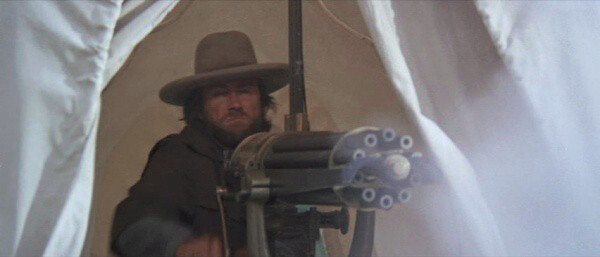
Jamie: “You can’t get ‘em all, Josie!”
Josie Wales: “That’s a fact.”
Jamie: “How come you’re doing this, then?”
Josie Wales: “Because I ain’t got nothing better to do.”
From “The Outlaw Josey Wales”, written by Forrest Carter, 1976
“Spread love and understanding,” Reacher said. “Use force if necessary.”
Jack Reacher, from “Never Go Back”, by Lee Child, 2013
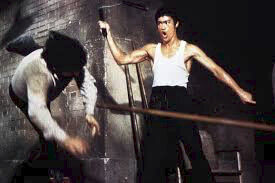
(Bruce Lee)
“Winning isn’t everything–but wanting to win is.”
― Vince Lombardi
“I haven’t celebrated coming in No. 2 too many times.”
― Mark Messier
“Opportunities multiply as they are seized.”
― From “The Art of War”, by Sun Tzu, 5th Century B.C.
"All courses of action are risky, so prudence is not in avoiding danger (it’s impossible), but calculating risk and acting decisively. Make mistakes of ambition and not mistakes of sloth. Develop the strength to do bold things, not the strength to suffer.””
From “The Prince”, by Niccolo Machiavelli, 1532
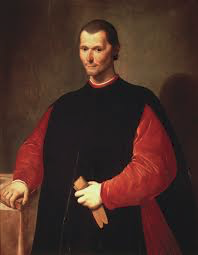
(Niccolo Machiavelli)
“Gandalf stood for a moment in thought. 'Maybe,’ he muttered. 'Maybe even your foolishness helped, my lad. Let me see: some five days ago now he would discover that we had thrown down Saruman, and had taken the Stone. Still what of that? We could not use it to much purpose, or without his knowing. Ah! I wonder. Aragorn? His time draws near. And he is strong and stern underneath. Pippin; bold, determined, able to take his own counsel and dare great risks at need. That may be it. He may have used the Stone and shown himself to the Enemy, challenging him, for this very purpose.”
From “The Return of the King”, by J.R.R. Tolkien, 1955
"For a while the king sat silent. At last he spoke. ‘So we come to it in the end,’ he said: ‘the great battle of our time, in which many things shall pass away. But at least there is no longer need for hiding. We will ride the straight way and the open road and with all our speed. The muster shall begin at once, and wait for none that tarry. Have you good store in Minas Tirith? For if we must ride now in all haste, then we must ride light, with but meal and water enough to last us into battle.’
‘We have very great store long prepared,’ answered Hirgon. ‘Ride now as light and as swift as you may!’
‘Then call the heralds, Éomer,’ said Théoden. ‘Let the Riders be marshalled!’
From "The Return of the King, by J.R.R. Tolkien, 1955
“You are well aware that it is not numbers or strength that bring the victories in war. No, it is when one side goes against the enemy with the gods’ gift of a stronger morale that their adversaries, as a rule, cannot withstand them. I have noticed this point too, my friends, that in soldiering the people whose one aim is to keep alive usually find a wretched and dishonorable death, while the people who, realizing that death is the common lot of all men, make it their endeavour to die with honour, somehow seem more often to reach old age and to have a happier life when they are alive. These are facts which you too should realize (our situation demands it) and should show that you yourselves are brave men and should call on the rest to do likewise.”
― From “The Persian Expedition”, by Xenophon, 370 B.C.
“Great results, can be achieved with small forces.”
― From “The Art of War”, by Sun Tzu, 5th Century B.C.
“Very well, we have found them; shall we fight them?”
“Have you good spurs, prince?”
“Why? Will they make us run away?”
“Nenni, en nom de Dieu! These English are ours—they are lost. They will fly. Who overtakes them will need good spurs. Forward—close up!”
By the time we had come up with La Hire the English had discovered our presence. Talbot’s force was marching in three bodies. First his advance-guard; then his artillery; then his battle-corps a good way in the rear. He was now out of the bush and in a fair open country. He at once posted his artillery, his advance-guard, and five hundred picked archers along some hedges where the French would be obliged to pass, and hoped to hold this position till his battle-corps could come up. Sir John Fastolfe urged the battle-corps into a gallop. Joan saw her opportunity and ordered La Hire to advance—which La Hire promptly did, launching his wild riders like a storm-wind, his customary fashion.
The duke and the Bastard wanted to follow, but Joan said—
“Not yet—wait.”
So they waited—impatiently, and fidgeting in their saddles. But she was ready—gazing straight before her, measuring, weighing, calculating—by shades, minutes, fractions of minutes, seconds—with all her great soul present, in eye, and set of head, and noble pose of body—but patient, steady, master of herself—master of herself and of the situation.
And yonder, receding, receding, plumes lifting and falling, lifting and falling, streamed the thundering charge of La Hire’s godless crew, La Hire’s great figure dominating it and his sword stretched aloft like a flagstaff.
“Oh, Satan and his Hellions, see them go!” Somebody muttered it in deep admiration.
And now he was closing up—closing up on Fastolfe’s rushing corps.
And now he struck it—struck it hard, and broke its order. It lifted the duke and the Bastard in their saddles to see it; and they turned, trembling with excitement, to Joan, saying—
“Now!”
But she put up her hand, still gazing, weighing, calculating, and said again—
“Wait—not yet.”
Fastolfe’s hard-driven battle-corps raged on like an avalanche toward the waiting advance-guard. Suddenly these conceived the idea that it was flying in panic before Joan; and so in that instant it broke and swarmed away in a mad panic itself, with Talbot storming and cursing after it.
Now was the golden time. Joan drove her spurs home and waved the advance with her sword. “Follow me!” she cried, and bent her head to her horse’s neck and sped away like the wind!
We went down into the confusion of that flying rout, and for three long hours we cut and hacked and stabbed. At last the bugles sang “Halt!”
The Battle of Patay was won.
From “Personal Recollections of Joan of Arc”, by Mark Twain, 1896
"We moved down the shore and Joan planted her standard before the bastille of the Augustins, the first of the formidable works that protected the end of the bridge. The trumpets sounded the assault, and two charges followed in handsome style; but we were too weak, as yet, for our main body was still lagging behind. Before we could gather for a third assault the garrison of St. Prive were seen coming up to reinforce the big bastille. They came on a run, and the Augustins sallied out, and both forces came against us with a rush, and sent our small army flying in a panic, and followed us, slashing and slaying, and shouting jeers and insults at us.
Joan was doing her best to rally the men, but their wits were gone, their hearts were dominated for the moment by the old-time dread of the English. Joan’s temper flamed up, and she halted and commanded the trumpets to sound the advance. Then she wheeled about and cried out:
‘If there is but a dozen of you that are not cowards, it is enough—follow me!’
Away she went, and after her a few dozen who had heard her words and been inspired by them. The pursuing force was astonished to see her sweeping down upon them with this handful of men, and it was their turn now to experience a grisly fright—surely this is a witch, this is a child of Satan! That was their thought—and without stopping to analyze the matter they turned and fled in a panic.
Our flying squadrons heard the bugle and turned to look; and when they saw the Maid’s banner speeding in the other direction and the enemy scrambling ahead of it in disorder, their courage returned and they came scouring after us.
La Hire heard it and hurried his force forward and caught up with us just as we were planting our banner again before the ramparts of the Augustins. We were strong enough now. We had a long and tough piece of work before us, but we carried it through before night, Joan keeping us hard at it, and she and La Hire saying we were able to take that big bastille, and must. The English fought like—well, they fought like the English; when that is said, there is no more to say. We made assault after assault, through the smoke and flame and the deafening cannon-blasts, and at last as the sun was sinking we carried the place with a rush, and planted our standard on its walls."
From “Personal Recollections of Joan of Arc”, by Mark Twain, 1896
(Saint Joan of Arc, by Mark Twain, published by Harper & Brothers, New York 1919)
“My works are like water. The works of the great masters are like wine. But everyone drinks water.
- From Mark Twain’s Notebook, 1885
“I like Joan of Arc best of all my books; and it is the best; I know it perfectly well. And besides, it furnished me seven times the pleasure afforded me by any of the others; twelve years of preparation, and two years of writing. The others need no preparation and got none.”
― Mark Twain
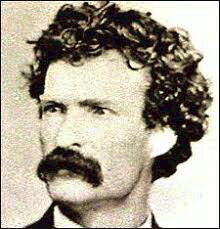
(Mark Twain)
“One day I was handed a few volumes of new literature unlike anything I had ever read before and so captivating as to make me utterly forget my hopeless state. They were the earlier works of Mark Twain and to them might have been due the miraculous recovery which followed. Twenty-five years later, when I met Mr. Clemens and we formed a friendship between us, I told him of the experience and was amazed to see that great man of laughter burst into tears.”
― Nikola Tesla
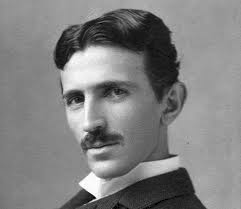
(Nicola Tesla)
“If you hold a cat by the tail, you learn things you can’t learn any other way."
– Mark Twain
“The scientists of today think deeply instead of clearly. One must be sane to think clearly, but one can think deeply and be quite insane.”
― Nikola Tesla
“May God have mercy upon my enemies, because I won’t.”
General George S. Patton, Jr.

(Major General George S. Patton) (Jeff Miller, Brooklyn, New York, 2020)
The sky now was quickly clearing and the sinking moon was shining brightly. But the light brought little hope to the Riders of the Mark. The enemy before them seemed to have grown rather than diminished, and still more were pressing up from the valley through the breach. The sortie upon the Rock gained only a brief respite. The assault on the gates was redoubled. Against the Deeping Wall the hosts of Isengard roared like a sea. Orcs and hillmen swarmed about its feet from end to end. Ropes with grappling hooks were hurled over the parapet faster than men could cut them or fling them back. Hundreds of long ladders were lifted up. Many were cast down in ruin, but many more replaced them, and Orcs sprang up them like apes in the dark forests of the South. Before the wall’s foot the dead and broken were piled like shingle in a storm; ever higher rose the hideous mounds, and still the enemy came on.
The men of Rohan grew weary. All their arrows were spent, and every shaft was shot; their swords were notched, and their shields were riven. Three times Aragorn and Éomer rallied them, and three times Andúril flamed in a desperate charge that drove the enemy from the wall.
Then a clamour arose in the Deep behind. Orcs had crept like rats through the culvert through which the stream flowed out. There they had gathered in the shadow of the cliffs, until the assault above was hottest and nearly all the men of the defence had rushed to the wall’s top. Then they sprang out. Already some had passed into the jaws of the Deep and were among the horses, fighting with the guards.
Down from the wall leapt Gimli with a fierce cry that echoed in the cliffs. ‘Khazâd! Khazâd!’ He soon had work enough.
‘Ai-oi!’ he shouted. ‘The Orcs are behind the wall. Ai-oi! Come, Legolas! There are enough for us both. Khazâd ai-mênu!’
Gamling the Old looked down from the Hornburg, hearing the great voice of the dwarf above all the tumult. ‘The Orcs are in the Deep!’ he cried. ‘Helm! Helm! Forth Helmingas!’ he shouted as he leaped down the stair from the Rock with many men of Westfold at his back.
From “The Two Towers”, by J.R.R. Tolkien, 1954
"“One mark of a great soldier is that he fight on his own terms or fights not at all.”
From “The Art of War”, by Sun Tzu, 5th Century B.C.
Though hordes of devils fill the land
All threatening to devour us,
We tremble not, unmoved we stand;
They cannot overpower us.
Let this world’s tyrant rage;
In battle we’ll engage!
His might is doomed to fail;
God’s judgment must prevail!
One little word subdues him.
From “A Mighty Fortress is our God”, by Martin Luther, 1531
“Now silently the host of Rohan moved forward into the field of Gondor, pouring in slowly but steadily, like the rising tide through breaches in a dike that men have thought secure. But the mind and will of the Black Captain were bent wholly on the falling city, and as yet no tidings came to him warning that his designs held any flaw.”
From “The Return of the King”, by J.R.R. Tolkien, 1955
In rode the Lord of the Nazgûl. A great black shape against the fires beyond he loomed up, grown to a vast menace of despair. In rode the Lord of the Nazgûl, under the archway that no enemy ever yet had passed, and all fled before his face.
All save one. There waiting, silent and still in the space before the Gate, sat Gandalf upon Shadowfax: Shadowfax who alone among the free horses of the earth endured the terror, unmoving, steadfast as a graven image in Rath Dínen.
“You cannot enter here,” said Gandalf, and the huge shadow halted. “Go back to the abyss prepared for you! Go back! Fall into the nothingness that awaits you and your Master. Go!”
The Black Rider flung back his hood, and behold! he had a kingly crown; and yet upon no head visible was it set. The red fires shone between it and the mantled shoulders vast and dark. From a mouth unseen there came a deadly laughter.
“Old fool!” he said. “Old fool! This is my hour. Do you not know Death when you see it? Die now and curse in vain!” And with that he lifted high his sword and flames ran down the blade.
And in that very moment, away behind in some courtyard of the city, a cock crowed. Shrill and clear he crowed, recking nothing of war nor of wizardry, welcoming only the morning that in the sky far above the shadows of death was coming with the dawn.
And as if in answer there came from far away another note. Horns, horns, horns, in dark Mindolluin’s sides they dimly echoed. Great horns of the north wildly blowing. Rohan had come at last.
From “The Return of the King”, by J.R.R. Tolkien, 1955
“Théoden King of the Mark had reached the road from the Gate to the River, and he turned towards the City that was now less than a mile distant. He slackened his speed a little, seeking new foes, and his knights came about him, and Dernhelm was with them. Southward beyond the road lay the main force of the Haradrim, and there their horsemen were gathered about the standard of their chieftain. And he looked out, and in the growing light he saw the banner of the king, and that it was far ahead of the battle with few men about it. Then he was filled with a red wrath and shouted aloud, and displaying his standard, black serpent upon scarlet, he came against the white horse and the green with great press of men; and the drawing of the scimitars of the Southrons was like a glitter of stars.
Then Théoden was aware of him, and would not wait for his onset, but crying to Snowmane he charged headlong to greet him. Great was the clash of their meeting. But the white fury of the Northmen burned the hotter, and more skilled was their knighthood with long spears and bitter. Fewer were they but they clove through the Southrons like a fire-bolt in a forest. Right through the press drove Théoden Thengel’s son, and his spear was shivered as he threw down their chieftain. Out swept his sword, and he spurred to the standard, hewed staff and bearer; and the black serpent foundered. Then all that was left unslain of their cavalry turned and fled far away.”
From “The Return of the King“, by J.R.R. Tolkien, 1955
At the last before the guests set oat Éomer and Éowyn came to Merry, and they said: ‘Farewell now, Meriadoc of the Shire and Holdwine of the Mark! Ride to good fortune, and ride back soon to our welcome!’
And Éomer said: ‘Kings of old would have laden you with gifts that a wain could not bear for your deeds upon the fields of Mundburg; and yet you will take naught, you say, but the arms that were given to you. This I suffer, for indeed I have no gift that is worthy; but my sister begs you to receive this small thing, as a memorial of Dernhelm and of the horns of the Mark at the coming of the morning.’
Then Éowyn gave to Merry an ancient horn, small but cunningly wrought all of fair silver with a baldric of green; and wrights had engraven upon it swift horsemen riding in a line that wound about it from the tip to the mouth; and there were set runes of great virtue.
‘This is an heirloom of our house,’ said Éowyn. ‘It was made by the Dwarves, and came from the hoard of Scatha the Worm. Eorl the Young brought it from the North. He that blows it at need shall set fear in the hearts of his enemies and joy in the hearts of his friends, and they shall hear him and come to him.’
Then Merry took the horn, for it could not be refused, and he kissed Éowyn’s hand; and they embraced him, and so they parted for that time.
From “The Return of the King”, by J.R.R. Tolkien, 1955
“Now an army may be likened to water, for just as flowing water avoids the heights and hastens to the lowlands, so any army avoids strength and strikes weakness. And as water shapes its flow in accordance with the ground, so an army manages its victory in accordance with the situation of the enemy. And as water has no constant form, there are in war no constant conditions. Thus, one able to gain the victory by modifying his tactics in accordance with the enemy situation may be said to be divine. Of the five elements, none is always predominant: of the four seasons, none lasts forever; of the days, some are long and some short, and the moon waxes and wanes.”
― From “The Art of War”, by Sun Tzu, 5th Century B.C.
“The best fighter is never angry.”
**― From "**Tao Te Ching", by Lao Tzu, 6th Century B.C.
Inigo Montoya: You are using Bonetti’s Defense against me, ah?
Man in Black: I thought it fitting considering the rocky terrain.
Inigo Montoya: Naturally, you must expect me to attack with Capo Ferro?
Man in Black: Naturally, but I find that Thibault cancels out Capo Ferro. Don’t you?
Inigo Montoya: Unless the enemy has studied his Agrippa…which I have!
From the 1987 film “The Princess Bride”, adapted by William Goldman from his 1973 novel
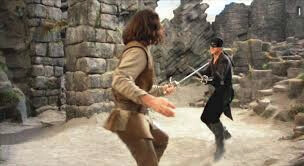
(Sword fight from “The Princess Bride”, 1987)
“What the ancients called a clever fighter is one who not only wins, but excels in winning with ease.”
― From “The Art of War”, by Sun Tzu, 5th Century B.C.
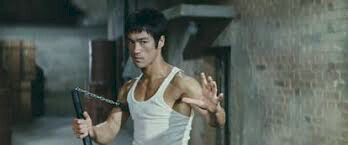
(Bruce Lee)
“I love to watch the Television in Babylon, especially the news because it’s so full of corruption. I-man know that it’s so full of corruption, there is bound to be an eruption!”
- Peter Tosh
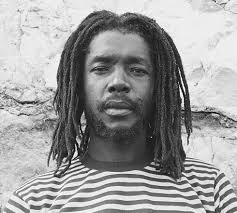
(Peter Tosh)
'Tis surprising to see how rapidly a panic will sometimes run through a country. All nations and ages have been subject to them. Britain has trembled like an ague at the report of a French fleet of flat-bottomed boats; and in the fifteenth century the whole English army, after ravaging the kingdom of France, was driven back like men petrified with fear; and this brave exploit was performed by a few broken forces collected and headed by a woman, Joan of Arc. Would that heaven might inspire some Jersey maid to spirit up her countrymen, and save her fair fellow sufferers from ravage and ravishment!
Yet panics, in some cases, have their uses; they produce as much good as hurt. Their duration is always short; the mind soon grows through them, and acquires a firmer habit than before. But their peculiar advantage is, that they are the touchstones of sincerity and hypocrisy, and bring things and men to light, which might otherwise have lain forever undiscovered. In fact, they have the same effect on secret traitors, which an imaginary apparition would have upon a private murderer. They sift out the hidden thoughts of man, and hold them up in public to the world. Many a disguised Tory has lately shown his head, that shall penitentially solemnize with curses the day on which Howe arrived upon the Delaware.
From “The American Crisis, No. 1”, by Thomas Paine, 1776
“On the whole, the best fortress you can have, is in not being hated by your subjects. If they hate you no fortress will save you.”
From “The Prince”, by Niccolò Machiavelli, 1532
“Things gained through unjust fraud are never secure.”
- Sophocles
“…and meanwhile take my assurance that the clouds are lifting and that I have every hope that the light of truth is breaking through”
― From “The Case-Book of Sherlock Holmes”, by Sir Arthur Conan Doyle, 1927
“You never change things by fighting the existing reality. To change something, build a new model that makes the existing model obsolete.”
― Buckminster Fuller
“They always say time changes things, but you actually have to change them yourself.”
― Andy Warhol, from “The Philosophy of Andy Warhol”, 1975
“Those who are crazy enough to think they can change the world usually do.”
― Steve Jobs
“A person with a new idea is a crank until the idea succeeds.”
- Mark Twain
“The world order is only parasitic…so there’s no reason to fear them. We are the ones in charge and it only takes a few people of conscience, focusing on the solutions to problems, to turn things around.”
- Don Croft
“The present is theirs; the future, for which I really worked, is mine.”
― Nikola Tesla
“Bishop to Bishop eight, discovered check, and, incidentally, mate."
Sherlock Holmes, from “Sherlock Holmes: A Game of Shadows”, written by Michele Mulroney and Kieran Mulroney, 2011
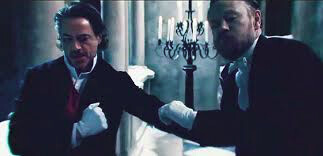
EPILOGUE
Is Jeff Miller the only one on the planet?
I feel deeply honored that Jeff is re-posting his Positive Changes reports after the NSA assassinated our webmaster and destroyed our forum, last month. He’s probably the only living human being who is documenting the fact that just about everything in the world is getting better. It’s clean, raw compiled data from the public record and is contrary to the incessant rantings to the contrary of the media, academia, no-account politicians and bureaucrats.
In this Ether War that the Old Parasite have been waging against our species throughout history Jeff’s ongoing compilation of evidence of positive changes is a potent strategic weapon. We entered this war almost accidentally by sharing some new etheric healing devices on the internet in 2001. Orgonite is the strategic weapon that ordinary people around the world (like Carol and I) are using to undermine and transmute the death-energy matrix that had been painstakingly woven throughout the world, over centuries and perhaps millenia, by The Old Parasite, which is my term for the corporate/occult world order.
Parasites are essentially weak, so they have to rely on hiding in order to do their work. Jeff’s monumental research work exposes the parasite like nothing else has done, in my opinion. In 1996 I started a business that I casually called, ‘World Without Parasites,’ but my main focus was the parasites inside bodies, which our zappers destroy with harmless (to the host) microcurrent. I soon found orgonite and recognized its potential for disagling the two legged parasites that live to excrete their spiritual (etheric) poison into the body politic and then I found Carol, who had the insight and skill to see the powerful and empowering dynamics of orgonite.
Before that, the Old Parasite was losing control of the course of history, I believe that is because humanity had started to wake up and be accountable for the first time in our history. I think this is why the enemy’s stated goal of reducing humanity to a half a million souls before the year 2000 utterly failed, for instance,
But it wasn’t until enough people around the world took responsibility for disabling the untold millions of then-new death towers in 2002 that the condition of our planet began to improve in a measurable way. It started slow in those early years but is building momentum, now. and Jeff is documenting it for the record. I think he’s earned an admirable and unique place in history and we’re ALL making history, now ;-).
Don Croft, on his Etheric Warriors forum, August 15, 2017
(Don Croft and Jeff Miller, Cranberry Township, Pennsylvania, Summer 2016)
Jeff Miller, Brooklyn, New York, January 5, 2020
If you’d like to be added to this free mailing list, or know someone who would be, please send me a note at [email protected]
You can access these articles online at https://forum.orgones.co.uk/c/positive-changes-that-are-occurring/






